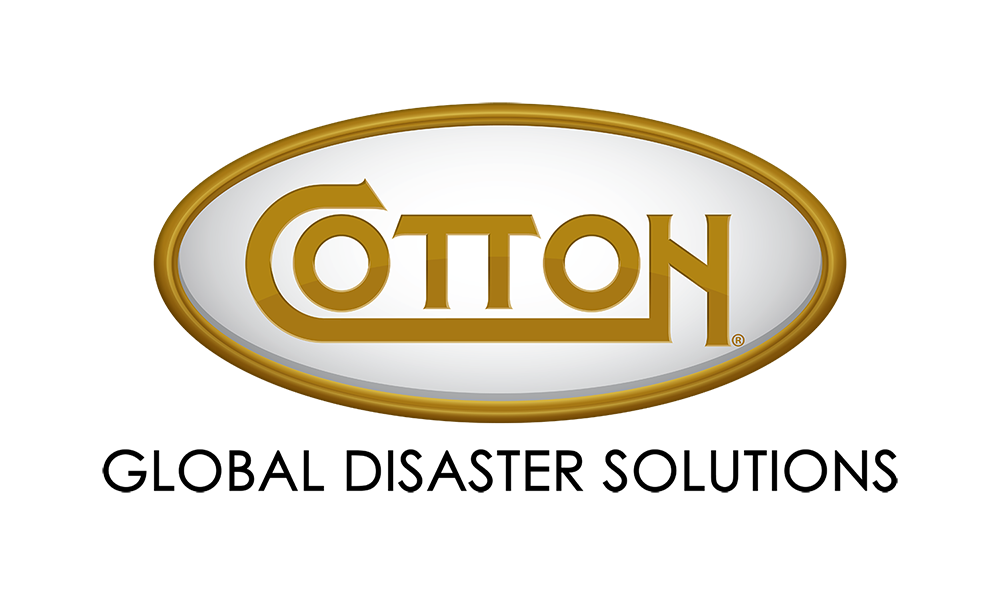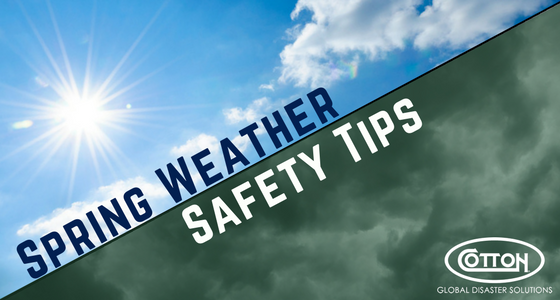Learn more about four Spring weather hazards to be prepared for
Spring arrives with generally warmer temperatures and lush greenery, however, the season can also bring severe weather. As temperatures can swing back and forth, with sunny days being followed by stormy nights, Cotton wants you to be aware of the dangers that may occur in this coming season. Take these steps to stay safe if severe conditions are predicted for your area that may affect your business.
THUNDERSTORMS Thunderstorms can cause the most severe weather bringing tornadoes, flooding, hail, and especially lightning. According to American Red Cross, lightning kills more people each year than tornadoes or hurricanes. Take thunderstorm watches and warnings seriously, as people may be harmed by either ignoring them or missing the signals.
- Identify trees that have weak branches that may be struck by lightning and cause damage to people, vehicles, or buildings.
- Do not operate heavy metal equipment during thunderstorms and stay clear of all utility wires and poles.
- Shutter windows and secure doors, also close windows, blinds and curtains.
- Unplug electrical equipment before the storm arrives or make sure your surge protectors are in order.
- Remain indoors until the storm passes.
- Have backup power sources in place in case there is a power outage.
TORNADOES Spring Tornadoes can lash out quickly and unexpectedly. Their sizable violence can completely uproot trees, destroy well-made structures, and even hurl objects into the air turning them into dangerous projectiles. Heed the emergency broadcast warnings to ensure the safety of your employees and yourself.
- Implement a notification system and make sure employees are familiar with the signal to head to safe areas.
- Take shelter in a secure area with no windows on the lowest floor of the building or in a basement.
- Monitor emergency broadcast stations for instructions.
- Remain in shelter until given the all-clear.
- If a hissing noise or odor of natural gas or propane is detected, leave property immediately get to a safe distance, and call the fire department using a cellular phone.
HAIL Hail storms are one of spring's most costly weather hazards. They can leave adverse damages to businesses, homes, vehicles, and vegetation. Monitor hail storm warnings and take measures to protect yourself.
- Look for signs of the approaching storm, such as darkening skies and increasing wind speeds.
- Put vehicles in garages and outdoor objects in storage to reduce damages.
- If you are outdoors, seek shelter immediately in a sturdy building. Do not go outside until the hailstorm passes as large hail can cause substantial injuries.
- Once you are inside keep away from windows, glass doors, and skylights.
- If you're on the road during a hailstorm, stay in the vehicle as it can furnish reasonable protection if you cannot get to a covered area.
FLOODING Flooding is a coast-to-coast epidemic that threatens the U.S. year-round but is at a seasonal high in the Spring. Whether it’s a few inches or several feet, flood water can have detrimental effects on your business and home. Take these steps to reduce the harm caused by flooding.
- Move vehicles away from flood zones or to upper levels of parking garages.
- Run elevators to an upper floor and cycle doors shut.
- If there is advance notice of potential flooding, relocate valuable or sensitive material off-site or to a higher elevation.
- Report contamination and hazardous spills to authorities.
- Remove all items that have been wet for more than 24 hours to prevent mold growth.
Often times severe weather arrives with little notice, leaving hardly any time for businesses to prepare. Plan ahead by consulting with Cotton regarding business continuance and recovery of property.
Contact us TODAY to get started: (713) 849-9300

